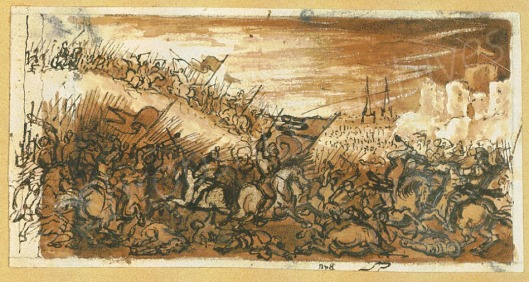Calixtus and Acaunissa remained leaders of the century in Narbo for another eleven months before the group was recalled to reinforce Legio I Flavia Martis (to which the century had been assigned before being dispatched to Narbo). The legions on the Rhine needed help during the turmoil that followed the assassination of Emperor Gratian. There, Mogurix finally got his fill of killing Germans. After only a few months, Calixtus was promoted to Centurion of the Second Cohort, and Acaunissa raised to Centurion. When the Germans launched a surprise attack in overwhelming numbers at a gate defended by Mogurix and two contubernii, some of the legionaries began to flee. The new Centurion called after them, "Will it not shame you to be missing from the stack of bodies where the slaughtered heroes lie?" Mogurix and his men held for an hour until relief arrived.
During the battle, Mogurix killed so many Germans that his sword became blunt, so he cut one's hand off with a single blow from his knife and crushed another man's skull with a giant rock. He was getting attacked from all sides during the fight – his helmet was destroyed, his shield was bristling with arrows, he was stabbed in the shoulder with a javelin, hit in the thigh by a sword, and shot in the left eye socket with an arrow! This only made him hate the Germans more. He pulled the arrow out of his own eye, threw it down, and resumed fighting. In the end, over ninety arrows were stuck in his shield! The giant Ausci warrior survived to fight again.*
Calixtus distinguished himself in his new position (second-ranking centurion in the entire legion). His quiet, but steadfast demeanor endeared him to his men and won the respect and reliance of his superiors. On New Years Day 384, Gaius Calixtus, of humble peasant stock, was raised to Primus Pilus of the Legio I Flavia Martis. Calixtus served valiantly in this position for four more years before retiring at age 45. He returned to his hometown of Casoria, near Neapolis in Campania. There he was most content to live out his years on a farm he received as an allotment for his years of service. Even at the advanced age of 45, he married a local widow, with a tidy fortune and fathered two children, both daughters. As he watched them grow, he often thought back with regret and sadness to the cruel and unjust death of the Goth chieftain’s daughter.
To be continued
*I am sure that many reading this description think that it is just wild exaggeration, brewed up from my fevered brain. Especially that a man could be hit in the eye by an arrow, remove it himself and continue fighting. This description is taken (with immaterial changes to fit here) from the actual battle description of a Centurion in Caesar's De Bello Civili. If you don't believe me, look up Marcus Cassius Scaeva.













 Overall, fantastic work, a real classic!
Overall, fantastic work, a real classic!